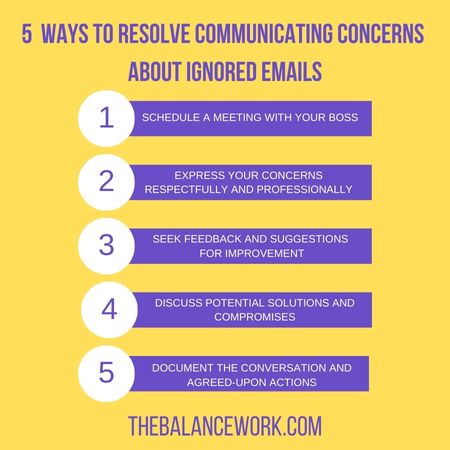When your boss ignores your emails, it can have a negative impact on employees, causing frustration, delayed progress, and lowered morale.
Timely responses from superiors play a significant role in maintaining smooth operations.
What Are The 5 Reasons When Your Boss Ignores Your Emails
There are several reasons why bosses may ignore emails in the workplace:
1. Lack Of Time Management:
One possible reason for bosses ignoring emails is a lack of effective time management.
Superiors may be overwhelmed with multiple tasks and responsibilities, leading to a scarcity of time to attend to all incoming messages promptly.
Prioritizing other pressing matters can result in emails being inadvertently overlooked or left unanswered.
2. Overwhelming Workload:
Another factor contributing to ignored emails is an overwhelming workload.
Bosses may be burdened with numerous projects, deadlines, and meetings, making it challenging to respond to every email in a timely manner.
The sheer volume of incoming messages can make it difficult for them to keep up, resulting in certain emails being unintentionally ignored or forgotten.
3. Miscommunication Or Misunderstanding:
Miscommunication or misunderstanding can also lead to ignored emails.
If the email content is unclear, lacks context, or is poorly structured, bosses may struggle to comprehend the message’s purpose or required action.
As a result, they might choose to ignore the email rather than risk misinterpreting it and making mistakes.
4. Personal Biases Or Preferences:
Personal biases or preferences can influence how bosses handle their emails.
They might prioritize certain individuals or topics based on personal relationships or perceived importance.
Consequently, emails from certain employees may receive preferential treatment, while others may be ignored or receive delayed responses.
5. Technical Issues Or Email Filters:
Technical issues or email filters can sometimes cause emails to be ignored unintentionally.
Spam filters or email sorting algorithms may erroneously divert important messages to the spam folder or other filtered categories, causing bosses to overlook them.
Similarly, technical glitches or malfunctions in email systems can result in emails not reaching their intended recipients or being lost in the digital ether.
Effects Of Ignored Emails On Employees:
The effects of bosses ignoring emails on employees can be detrimental to both individuals and the overall functioning of an organization:
1. Increased Frustration And Demotivation:
When bosses ignore emails, it can cause a significant increase in frustration and demotivation among employees.
The act of being ignored or not receiving a response to an important email can make employees feel undervalued, disregarded, and unimportant.
This frustration can lead to a decrease in employee morale and overall job satisfaction, as they may perceive their efforts as going unnoticed or unappreciated.
2. Delayed Decision-Making And Project Progress:
Ignored emails can also result in delayed decision-making and hinder project progress.
Employees often rely on timely responses from their superiors to make informed decisions, seek approvals, or obtain necessary information.
When these emails go unanswered, it creates bottlenecks and delays in the decision-making process.
Consequently, projects may experience setbacks, deadlines may be missed, and overall productivity can suffer.
3. Impaired Collaboration And Teamwork:
Ignored emails can have a detrimental effect on collaboration and teamwork within an organization.

Effective collaboration often relies on clear and timely communication, including email exchanges.
When bosses ignore emails, it can create a breakdown in communication channels and hinder the flow of information between team members.
Ignorance at workplace can lead to misunderstandings, duplication of efforts, and a lack of coordination, ultimately impairing collaboration and hindering the achievement of shared goals.
4. Lowered Trust And Employee Morale:
Ignored emails can erode trust between employees and their bosses.
Trust is an essential element in any workplace, and when employees’ emails are ignored, it can create a perception of indifference or disregard.
This can result in a breakdown of trust between employees and their superiors, leading to strained relationships and a negative work environment.
Lowered trust can also have a detrimental impact on employee morale, as employees may feel hesitant to reach out or communicate openly, fearing their efforts will go unnoticed or unacknowledged.
5. Negative Impact On Overall Productivity:
Ultimately, ignored emails can have a significant negative impact on overall productivity within an organization.
When employees’ emails are ignored, it can lead to wasted time, increased frustration, and reduced efficiency.
Important tasks may be delayed or left incomplete due to the lack of necessary information or approvals.
Additionally, the accumulation of ignored emails can create a backlog of unanswered requests and inquiries, further exacerbating the productivity decline.
Strategies To Deal With Ignored Emails:
When faced with ignored emails, there are several strategies that individuals can employ to address the issue effectively.
1. Assessing The Urgency And Importance Of The Email:
One strategy to deal with ignored emails is to assess the urgency and importance of the email.
Not all emails require immediate attention, and understanding the priority level can help manage expectations.
Consider the impact and consequences of the unanswered email, and if it can wait, be patient.
However, if it’s time-sensitive or critical, it may be necessary to pursue alternative actions.
2. Following Up Tactfully And Professionally:
When faced with an ignored email, it’s important to follow up tactfully and professionally.
Send a gentle reminder to the recipient, politely expressing the importance or urgency of the email.
Avoid sounding demanding or confrontational, as it may create unnecessary tension.
Use a respectful tone and provide a concise summary of the original email to jog their memory or clarify the context.
3. Utilizing Alternative Communication Channels:
If emails continue to be ignored, it can be beneficial to explore alternative communication channels.
Consider using instant messaging platforms, such as Slack or Microsoft Teams, to reach out to the recipient.

These tools provide real-time communication and can facilitate quicker responses.
However, ensure that the use of alternative channels aligns with the established communication practices within your organization.
4. Requesting Face-To-Face Or Virtual Meetings:
In certain situations, where emails are consistently ignored or require detailed discussions, requesting a face-to-face or virtual meeting can be an effective strategy.
This allows for direct communication, enabling immediate clarification and problem-solving.
Schedule a meeting with the recipient and clearly outline the purpose and agenda, ensuring that all relevant parties are present for effective communication.
5. Seeking Clarification Or Confirmation Through Other Colleagues:
If the recipient continues to ignore emails, seeking clarification or confirmation through other colleagues can help resolve the issue.
Approach a trusted colleague who may have insights into the recipient’s schedule or preferred communication style.
Politely inquire if they can follow up or intervene on your behalf. However, exercise discretion and ensure that you respect any office hierarchies or protocols when involving others.
Improving Email Communication With Your Boss:
To improve email communication with your boss, it’s important to follow these tips:
1. Crafting Clear And Concise Emails:
Use precise language and structure your email in a logical and organized manner.
Clearly state the purpose of the email, provide necessary details, and be mindful of the length to ensure it is easily readable and comprehensible.
2. Using Appropriate Subject Lines:
Using appropriate subject lines can enhance the effectiveness of your emails.
Choose subject lines that accurately reflect the content of the email and are concise yet informative.
This helps your boss understand the nature of the email at a glance and increases the chances of it being opened and read promptly.
3. Prioritizing Important Information:
When composing emails to your boss, prioritize important information. Place crucial details or requests at the beginning of the email to ensure they are not overlooked.
Use bullet points or formatting techniques to highlight key points.
Make the information easily scannable for your boss, enabling them to grasp the main points quickly.
4. Formatting Emails For Readability:
Formatting your emails for readability is essential to improve communication.
Use proper paragraphs, line breaks, and white spaces to make your email visually appealing and easier to read.

Avoid long blocks of text and consider using headings, bold or italicized text, and bullet points to break up the content and draw attention to important details.
5. Considering Your Boss’s Communication Preferences:
Understanding your boss’s communication preferences is crucial for effective email communication.
Pay attention to their preferred tone, level of formality, and response time expectations.
Adapt your communication style accordingly to ensure a better alignment and enhance the chances of your emails receiving prompt attention and responses.
Resolve Communicating Concerns About Ignored Emails
To resolve the communication concerns, make sure to follow these tips:
1. Schedule A Meeting With Your Boss:
When faced with persistent issues of ignored emails, it may be necessary to schedule a meeting with your boss.
Request a dedicated time to discuss your concerns and find solutions collaboratively.

This allows for a focused conversation and ensures that both parties have an opportunity to express their perspectives.
2. Express Your Concerns Respectfully And Professionally:
When communicating your concerns about ignored emails, it is crucial to do so respectfully and professionally.
Clearly articulate how the issue is impacting your work and the challenges it presents. Use specific examples to illustrate your point and avoid placing blame.
Express your concerns in a calm and constructive manner, emphasizing the importance of effective communication for achieving mutual goals.
3. Seek Feedback And Suggestions For Improvement:
During the meeting, actively seek feedback and suggestions for improvement from your boss.
Engage in a dialogue to understand their perspective and any challenges they may be facing.
This demonstrates a willingness to collaborate and find mutually beneficial solutions.
Openly listen to their feedback and be receptive to their suggestions for better communication practices.
4. Discuss Potential Solutions And Compromises:
Explore potential solutions and compromises to address the issue of ignored emails. Brainstorm together with your boss to find strategies that can work for both parties.
This may involve establishing clearer communication protocols, setting expectations for response times, or exploring alternative communication channels.
Strive for a mutually agreed-upon approach that improves communication and ensures that important messages are not overlooked.
5. Document The Conversation And Agreed-Upon Actions:
After the meeting, document the conversation and any agreed-upon actions. This helps ensure clarity and serves as a reference point for both parties.
Summarize the key points discussed, decisions made, and any action steps identified.
Share the document with your boss for their review and confirmation, reinforcing the commitment to addressing the issue and improving communication moving forward.
Conclusion:
In conclusion, effective email communication with your boss is crucial for maintaining productive and collaborative work relationships.
By actively addressing and resolving issues of ignored emails, you can improve communication dynamics, enhance efficiency, and foster a positive work environment.
Remember, effective communication is a two-way street, and by taking proactive steps to improve email communication, you contribute to a more cohesive and successful workplace.
Last Updated on 4 months by Eesha Khan
- Why Does My Boss Wink At Me? 6 Potential Reasons - October 5, 2023
- Is It Legal For Your Employer To Call Your Doctor? No, But… - October 4, 2023
- 12 Ways To Deal With A Low IQ Person - September 22, 2023